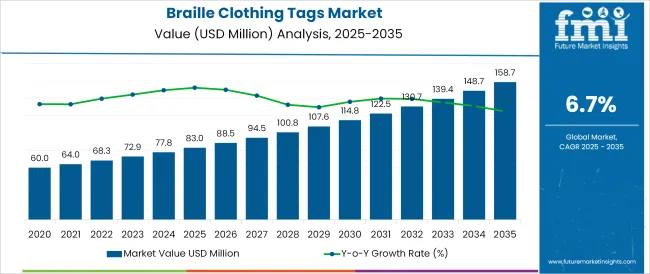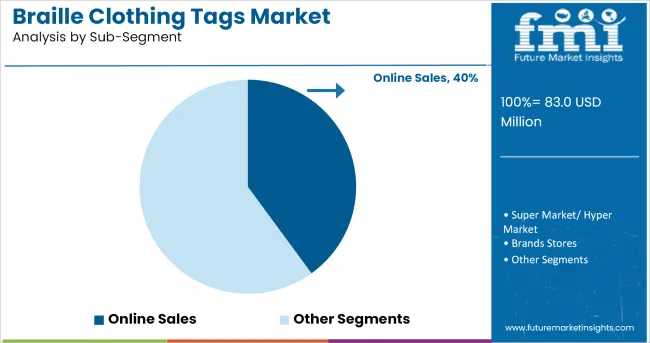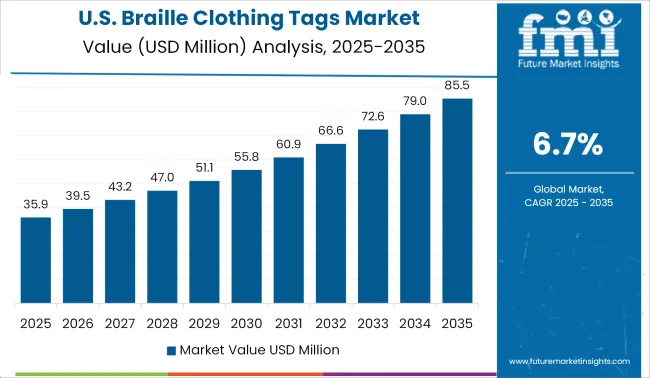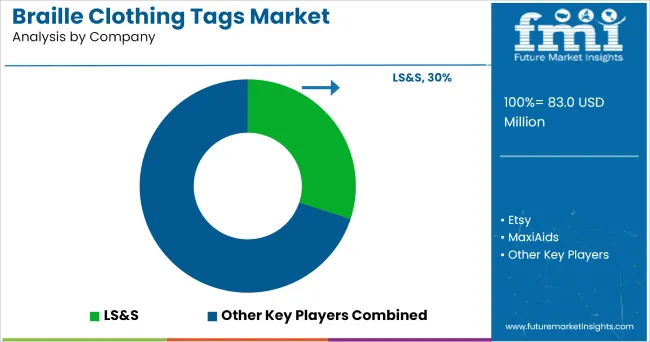The Braille Clothing Tags Market is estimated to be valued at USD 83.0 million in 2025 and is projected to reach USD 158.7 million by 2035, registering a compound annual growth rate (CAGR) of 6.7% over the forecast period.

The Braille clothing tags market is evolving steadily as inclusivity, accessibility, and regulatory compliance gain prominence across the apparel industry. Heightened awareness about the needs of visually impaired consumers and the growing demand for universal design in fashion have been instrumental in fostering adoption.
Apparel brands are increasingly integrating Braille tags to enhance customer experience, align with social responsibility goals, and meet emerging accessibility standards. Technological advancements in materials and embossing techniques are making production more cost-effective and scalable, enabling broader application across different clothing categories.
Future growth is expected to be supported by stronger collaboration between advocacy groups and manufacturers, greater emphasis on inclusive branding, and rising adoption of tactile identifiers in premium and mass-market apparel alike. Ongoing efforts to standardize design and ensure durability are paving the way for long-term market development and mainstream acceptance.
The market is segmented by Sub‑Segment and region. By Sub‑Segment, the market is divided into Brand Name, Colour, Coordinating Style, Washing Instructions, Fabric description, Clothing type, Size, and Clothing numbers. In terms of Sub‑Segment, the market is classified into Aluminum and Cloth.
Based on Sub‑Segment, the market is segmented into Online Sales, Super Market/ Hyper Market, Brands Stores, and Retail Stores. Regionally, the market is classified into North America, Latin America, Western Europe, Eastern Europe, Balkan & Baltic Countries, Russia & Belarus, Central Asia, East Asia, South Asia & Pacific, and the Middle East & Africa.
When segmented by type, the brand name sub-segment is expected to hold 25.0% of the market revenue in 2025, establishing itself as a significant contributor to the market. This share has been driven by apparel companies’ efforts to reinforce brand identity while catering to accessibility needs.
The inclusion of Braille alongside traditional brand names has been adopted as a way to communicate inclusivity and enhance customer loyalty among visually impaired consumers. The ability of these tags to serve both functional and promotional purposes has improved their perceived value, encouraging brands to invest in aesthetically aligned yet accessible designs.
Additionally, the rising influence of brand equity in consumer choices has encouraged designers to ensure that even Braille tags reflect the brand’s visual and tactile identity, reinforcing the segment’s growth.
Segmented by material, aluminum is projected to capture 60.0% of the market revenue in 2025, making it the leading material in this space. The dominance of aluminum has been reinforced by its durability, tactile clarity, and premium feel, which align with the functional and aesthetic expectations of Braille tag users.
Aluminum tags have been favored for their resistance to wear and ability to maintain embossing integrity over time, ensuring long lasting legibility. Their lightweight yet sturdy nature has facilitated seamless integration into garments without compromising comfort or design.
Furthermore, the perception of aluminum as a sustainable and recyclable material has contributed to its growing acceptance among environmentally conscious brands, solidifying its leadership within the material segment.

When segmented by sales channel, the online sales sub-segment is anticipated to account for 40.0% of the market revenue in 2025, positioning it as a prominent distribution channel. This share has been supported by the convenience and reach of e-commerce platforms, which have expanded accessibility for niche products such as Braille clothing tags.
The ability to offer customized, small-batch, or branded tags directly to consumers and businesses has been enhanced through online marketplaces and direct to consumer websites. Additionally, the growing reliance on digital channels for procurement, combined with lower distribution costs and wider product visibility, has made online sales an attractive option for both buyers and manufacturers.
The flexibility of showcasing designs, materials, and customization options online has further accelerated adoption, reinforcing the significance of this segment in driving market growth.
The market is driven by the increasing sensitivity of people towards visually impaired people to provide them with a better lifestyle. As these tags number and imbedded information will help blind people for easy colour coordination and after use information of the cloths.
However, the restraint of this product is as may cause skin irritation which has limited its application. But the material is expected to overcome the restraint in the forthcoming years.
Because the increased acceptance rate for preserving precision while creating any clothes has resulted in more investment in research and development, braille clothing tags sales are projected to skyrocket in the clothing and accessories industries.
Demand would undoubtedly increase if expected development in end-use industries occurred, resulting in rapid penetration. The market is expected to open up significant potential opportunities as a result of the aspects listed above.

In the latest report by FMI, on” Braille Clothing Tags Market” includes North America, Latin America, Europe, East Asia, South Asia and the Middle East and Africa.
South Asia is the prominent region in the industry owing to the fact it is having the largest number of people who are blind which approximately accounts for 53.2% of the world visually impaired people. This has provided a huge opportunity for the market. India is leading the region with 15 million people as blind.
The Middle East and Africa and Europe are following the growth trajectory same as of South Asia. These regions are expected to show moderate growth in the forthcoming period.
In support of the above statement, the overhead mentioned region have a well-established background in the textile and metallurgical industry. Due to this South Asia is creating a trend in the market by the development of various products.
Howbeit North America being the leading economy contributes a minor portion to the industry. Due to the rise of the manufacturing sector, the region appears to be modestly profitable.
The Middle East & Africa, on the other hand, holds the smallest share of braille clothing tags market and is predicted to expand at a moderate rate, registering a negligible worldwide revenue market share by the conclusion of the assessment period.
Metal tags are gaining popularity despite having one restraint. The advantage of a metal tag over a cloth tag is that cloth tags get cripple after few washes creating difficulty for the person to utilize them.
Metal tags can withstand harsh washing conditions as they are long-lasting and durable. Metal tags are mostly made up of aluminium so that they could resist harsh temperature conditions and do corrode easily.

The prominent market player of Braille Clothing Tags is
Market participants' ability to adapt to the changing nature of the cases material market is important to their long-term success. To realize the latent potential of custom development and ensure their clients' loyalty, manufacturers must go beyond their typical production capabilities.
Manufacturers are coming up with innovative ideas to expand their product portfolio which will attract a huge customer base and securing their market position. For this, they are turning towards organic and inorganic growth strategies such as a merger, acquisition, product launch, partnership etc.
Because of the specialized labour skills of the location manufacturing the goods, the majority of the product suppliers come from North America and Europe. Furthermore, economies of scale play a significant role in driving demand for braille clothing tags.
The report is a compilation of first-hand information, qualitative and quantitative assessment by industry analysts, inputs from industry experts and industry participants across the value chain. The report provides in-depth analysis of parent market trends, macro-economic indicators and governing factors along with market attractiveness as per segments.
The report also maps the qualitative impact of various market factors on market segments and geographies.
The global braille clothing tags market is estimated to be valued at USD 83.0 million in 2025.
The market size for the braille clothing tags market is projected to reach USD 158.7 million by 2035.
The braille clothing tags market is expected to grow at a 6.7% CAGR between 2025 and 2035.
The key product types in braille clothing tags market are brand name, colour, coordinating style, washing instructions, fabric description, clothing type, size and clothing numbers.
In terms of sub‑segment, aluminum segment to command 60.0% share in the braille clothing tags market in 2025.






Full Research Suite comprises of:
Market outlook & trends analysis
Interviews & case studies
Strategic recommendations
Vendor profiles & capabilities analysis
5-year forecasts
8 regions and 60+ country-level data splits
Market segment data splits
12 months of continuous data updates
DELIVERED AS:
PDF EXCEL ONLINE
Industry Share Analysis for Braille Clothing Tags Companies
Braille Cartons Packaging Market Size and Share Forecast Outlook 2025 to 2035
Braille Labels Market Size and Share Forecast Outlook 2025 to 2035
Competitive Breakdown of Braille Labels Manufacturers
Leading Providers & Market Share in Braille Cartons Packaging
Digital Braille Displays Market Size and Share Forecast Outlook 2025 to 2035
Clothing Fibers Market Size and Share Forecast Outlook 2025 to 2035
Clothing Recycling Market Analysis – Growth & Trends 2025 to 2035
Pet Clothing Market Size and Share Forecast Outlook 2025 to 2035
Vegan Clothing Market Analysis - Size, Share and Forecast 2025 to 2035
Smart Clothing Market – Wearable Tech & Health Insights
Online Clothing Rental Market Size and Share Forecast Outlook 2025 to 2035
Assessing Online Clothing Rental Market Share & Industry Insights
Cosplay Clothing Market Trends - Growth & Forecast to 2025 to 2035
Plus-Size Clothing Market Growth - Demand & Forecast 2025 to 2035
Triathlon Clothing Market Analysis - Trends, Growth & Forecast 2025 to 2035
Protective Clothing Market - Trends, Growth & Forecast 2025 to 2035
Sports Inspired Clothing Market Analysis – Trends, Growth & Forecast 2025-2035
High Visibility Clothing Market Growth – Demand & Forecast 2024-2034
Nonwoven Protective Clothing Market Size and Share Forecast Outlook 2025 to 2035

Thank you!
You will receive an email from our Business Development Manager. Please be sure to check your SPAM/JUNK folder too.
Chat With
MaRIA